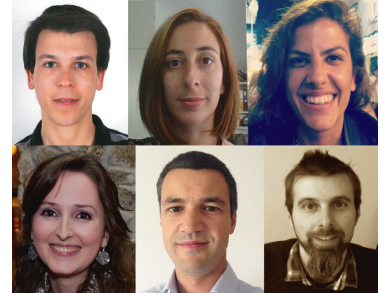1. History, Organization, and Goals of the Young Chemists Group of the Portuguese Chemical Society
The Young Chemists Group (Grupo de Químicos Jovens, GQJ) of the Portuguese Chemical Society (Sociedade Portuguesa de Química, SPQ) was created on December 8, 2007, to represent the community of Portuguese chemists under the age of 35. The GQJ has over 300 members, which accounts for 24 % of the total members of SPQ, which was founded on December 28, 1911.
Since its foundation, the GQJ has been led by five different boards of Portuguese young chemists, which change every two years (see Fig. 1). The well-defined and common goal of the group is to advance and promote chemistry among young scientists working in academia and industry, high school students, and the general public.
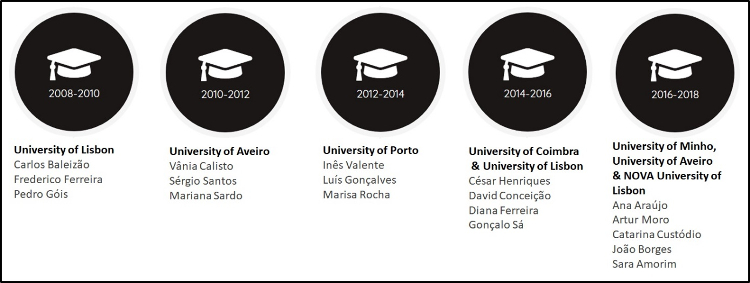 |
|
Figure 1. Board members and leadership of the GQJ since 2008. |
This goal has been achieved by organizing several activities that aim at:
- Promoting the exchange of knowledge, scientific interactions, and networking among young chemists in Portuguese research centers
- Linking the Portuguese young chemists’ community working within and outside Portugal, in both academia and industry
- Fostering chemistry-based science outreach and public engagement activities, as well as competitions in high schools and universities
- Representing Portuguese young chemists at international conferences and in an international context, such as the European Young Chemists’ Network (EYCN)
Since April 2016, the board of the GQJ is composed of João Borges, Ana Rita Araújo, Catarina Custódio, Sara Amorim, and Artur Moro.
 |
|
Current board members of the GQJ. From left to right: João Borges (Postdoctoral researcher at University of Aveiro), Ana Rita Araújo (Ph.D. student at University of Minho), Catarina Custódio (Postdoctoral researcher at University of Aveiro), Sara Amorim (Ph.D. student at University of Minho), Artur Moro (Postdoctoral researcher at NOVA University of Lisbon) and Leonardo Mendes (SPQ Secretariat). |
2. Activities Promoted by the GQJ
Over the last decade, the GQJ has organized several activities to promote chemistry among young researchers linked to academia or industry, as well as among high school students, who could be the next generation of scientists and leaders in the chemistry arena.
2.1. Activities for Undergraduate or Graduate Students and Young Chemists
2.1.1. Portuguese Young Chemists Meeting (PYCheM)
The GQJ organizes biennial conferences, mainly aimed at young chemists, throughout Portugal. The meetings provide a pleasant and stimulating environment to allow them to present their research work across the chemical sciences and network with their peers and world-renowned scientists and professionals in the field.
The beginning of the PYCheM roadmap (see Fig. 2) dates back to October 2008 with the organization of the first PYCheM in Lisbon. The fifth PYCheM, which encompassed the first European Young Chemists Meeting (1st EYCheM), took place in Guimarães in April 2016 and was officially endorsed by the European Association for Chemical and Molecular Sciences (EuCheMS). It brought together young chemists from all over Europe and elsewhere with a high-quality scientific program covering recent research in chemistry (see Fig. 3).
The biennial PYCheMs have included several plenary lectures by Nobel Laureates in Chemistry, including Kurt Wüthrich (2002), Aaron Ciechanover (2004), Ada Yonath (2009), and Ei-ichi Negishi (2010). Moreover, the PYCheMs also feature keynote lectures by distinguished scientists, as well as oral and poster presentations by young chemists, including Master and Ph.D. students and postdoctoral researchers.
These meetings, which have been gathering between 200 and 250 participants in each event, provide a unique opportunity for young chemists to showcase their research and creativity, engage in scientific debate, network, make new contacts, and foster fruitful collaborations.
In 2018, the 6th PYCheM will take place in Setúbal from May 15 to 18. An award for the best poster will be kindly sponsored by EYCN in collaboration with Evonik Industries. More info and updates can be found at http://6pychem.eventos.chemistry.pt/.
 |
|
Figure 2. PYCheMs that took place every two years since 2008. The 1st EYCheM took place together with the 5th PYCheM in Guimarães (Portugal) in April 2016. |
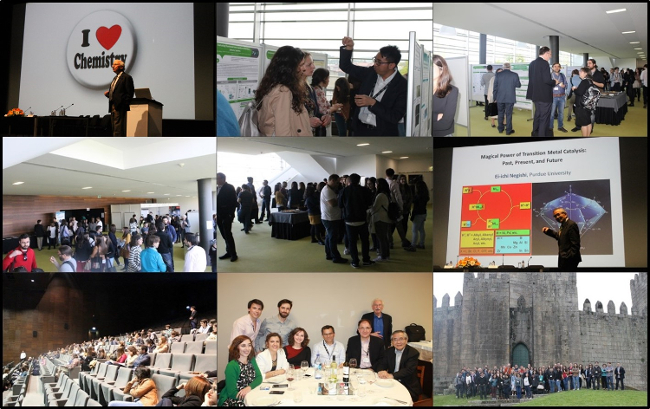 |
|
Figure 3. Photos taken at the 5th PYCheM & 1st EYCheM held in Guimarães, Portugal, in April 2016. |
2.1.2. Portuguese Young Chemists Award (PYCA)
The Portuguese Young Chemists Award (PYCA) is awarded every two years to young Ph.D. holders in chemistry (under 35 years old) and is presented at PYCheM. The award aims at rewarding the best Ph.D. thesis in any field of the chemical sciences and is open to both Portuguese and foreign young chemists who complete their Ph.D. degree at a Portuguese University.
The prize aims at supporting outstanding research and excellence in chemistry among young chemists at the early stages of their careers, with an emphasis on the scientific quality and impact, as well as the capacity to communicate the outcomes of their Ph.D. studies to society. The awardee is invited to deliver an oral presentation at PYCheM and write an article for the SPQ’s magazine QUÍMICA. The awardee also receives a certificate of distinction and a monetary prize (see Fig. 4).
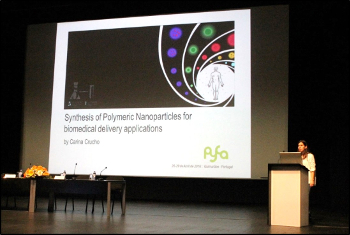 |
|
Figure 4. Invited oral presentation by the PYCA 2016 awardee at the 5th PYCheM & 1st EYCheM held in Guimarães, Portugal, in April 2016. |
2.2. Activities Aimed at High School Students
2.2.1. Science Outreach and Public Engagement Activities
The GQJ board members give talks at Portuguese high schools to raise public awareness of the key role and extraordinary impact of chemistry in our daily lives and the broad range of professional careers that people with a chemistry background can pursue. The talks also enable us to introduce GQJ activities, mainly those aimed at high school students (see the “ChemRus” contest below).
Since 2016, the talks have been complemented with “magic chemistry moments” by a chemist and magician (Filipe Monteiro), as well as hands-on experiments by students. These activities aim at highlighting key concepts in the chemical sciences, foster students’ interest for the beauty of chemistry, and encourage them to pursue chemistry courses at Portuguese Universities and abroad (see Fig. 5).
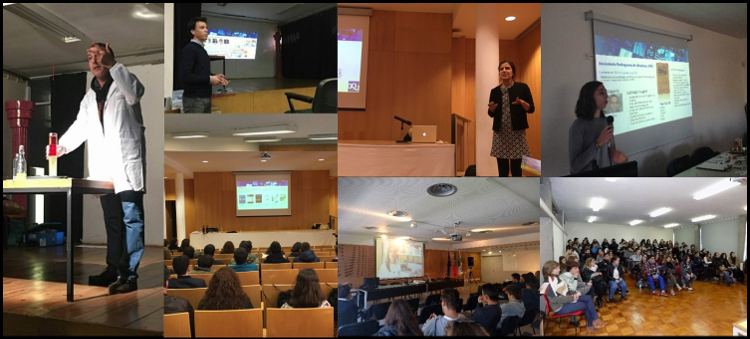 |
|
Figure 5. Science outreach activities at Portuguese high schools. |
2.2.2. ChemRus Contest
Since 2012, the GQJ promotes chemistry among Portuguese high school students by running an annual competition entitled “ChemRus”. It intends to select and reward those high schools and students that make the best scientific videos based on their chemical knowledge. The winning students receive a scientific toy, didactic material, and a certificate, and their high schools receive laboratory material. You can find some videos on YouTube.
Since the pioneering and successful contest launched by the GQJ in 2012, this activity has been pursued at a European level by the EYCN, which launched a video contest entitled “Chemistry Rediscovered”. This contest aims to reward the best scientific videos among those selected from the EYCN-member national chemical societies. The first edition of this project was held in 2017 and the first two prizes were awarded to Portuguese high school students (see Fig. 6).
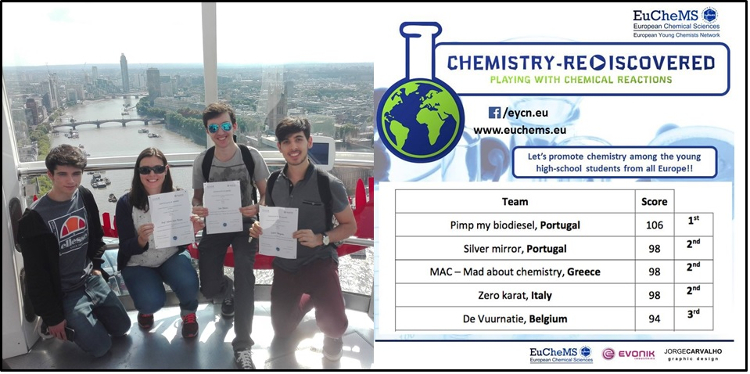 |
|
Figure 6. Winners of the “ChemRus” and “Chemistry Rediscovered” contests in 2017 (© EYCN). |
3. GQJ and the European Young Chemists’ Network (EYCN)
The GQJ represents the Portuguese young chemists in all activities promoted by EYCN. It takes part in the Delegates Assemblies (EYCN DAs) that are organized once a year by a young chemists group and/or member national chemical society. To date, the GQJ had the honor to organize two EYCN DAs in Portugal: one in Aveiro in May 2012 and another in Guimarães in April 2016 (see Fig. 7).
Furthermore, the GQJ supports EYCN activities and projects aimed at promoting chemistry in Europe and strengthening the collaboration and exchange of knowledge and experience among young chemists from different European countries.
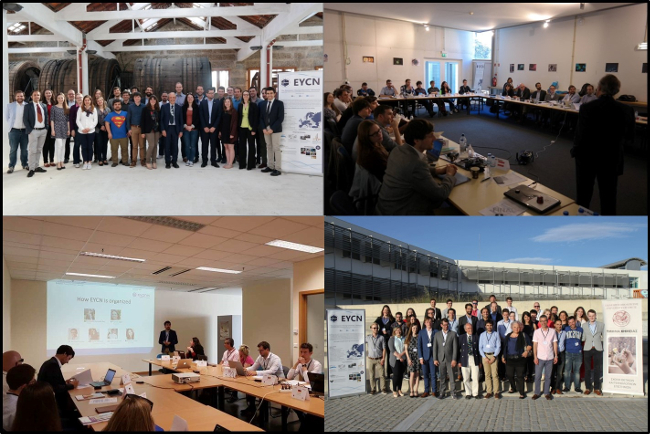 |
|
Figure 7. EYCN delegates that attended the 11th and 12th EYCN Delegates Assembly in Guimarães, Portugal (top) and Heraklion, Greece (bottom), respectively. |
In summary, the activities promoted by the GQJ have significantly contributed to improved networking amongst young chemists. Outreach activities at high schools have demonstrated the ubiquitous character of chemistry in the world. The participation in international activities has contributed to strengthening the GQJ’s position in the promotion of chemistry at both the national and international levels.
For more information on the GQJ’s activities, please check our website and follow us on Facebook.
Also of Interest
- EYCN: Ten Years Connecting Young Chemists,
Fernando Gomollón-Bel, Camille Oger, Cristina Todasca,
ChemistryViews.org 2015.
https://doi.org/10.1002/chemv.201500500
Founded in 2006, today the European Young Chemists’ Network (EYCN) represents 26 chemical societies from 22 different countries - Introducing the European Young Chemist Network (EYCN),
European Young Chemists Network team,
ChemistryViews.org 2012.
https://doi.org/10.1002/chemv.201200122
The EYCN supports chemists as they begin their careers, with activities aimed at developing soft skills and broadening career possibilities
